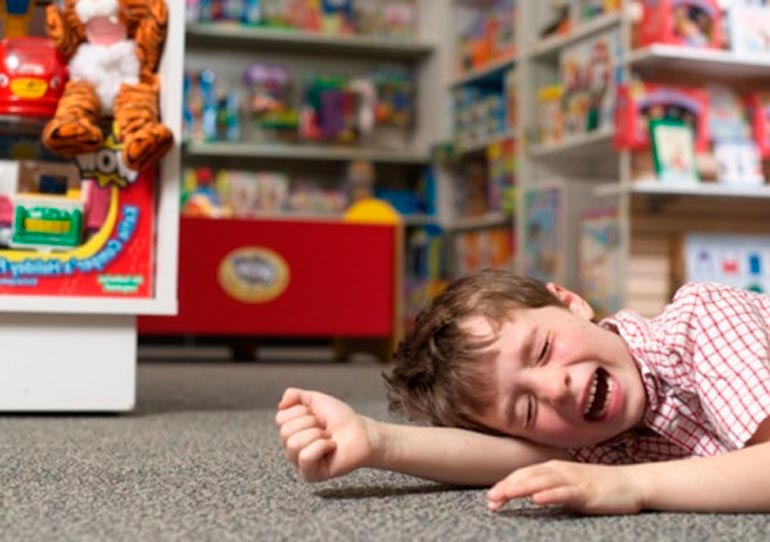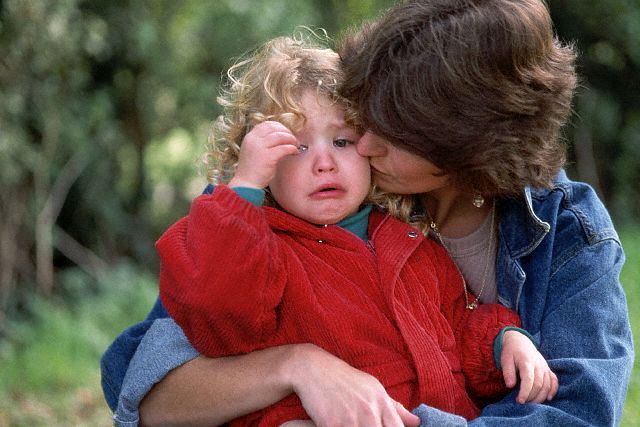Each parent was faced with this unpleasant phenomenon - children's hysteria. Someone prefers to ignore baby whims, others begin to get annoyed and loudly scold the screaming child. But child psychologists ask parents to be more careful: there are two types of child hysteria, each of which requires radically different parental reactions. And it is important to be able to distinguish between them.

Hysteria of the upper brain (upper floor)
This type of childish hysteria is generated by momentary emotions, strong discontent, or the desire to immediately get your own. In other words, this is the same unpleasant situation when your child suddenly gets up in the middle of the store, shouting and stamping his feet, insistently demanding to buy him a new doll or a radio-controlled machine. This hysteria is a banal attempt to manipulate a parent in order to achieve the desired. It occurs in the upper part of the brain and is completely controlled by the child himself.
We read in detail: children's hysteria in the store - how to react to parents

In such a hysteria, the child completely controls himself, is well aware of what is happening around, because the cause of the hysteria of the upper floor is his own decision to arrange it. Even if it doesn’t seem to the parent from the outside, but in this situation his child is completely adequate. This is easy to verify: buy the child the desired toy, and in a split second he will become calm again, and his mood will return to normal.
The hysteria of the upper floor is a kind of moral terrorism, for the resolution of which there are only two ways:
- Agree and give the child what he requires.
- Ignore the tantrum so that the child understands - his performance has no spectators.
Psychologists advise calmly treat children's tantrums of this kind. Keep your composure, stay cool. Do not follow your child’s wishes so that he doesn’t use such a “dirty trick” in the future for easy and unconditional achievement of his goals. Explain to him in a calm tone that at the moment you cannot fulfill his desire. Give weighty arguments, tell us why you refuse, for example, to buy a new machine. The child must learn that for the realization of his momentary desire is now banal there is no possibility. And that you do not just refuse him to insist on your own.
A child will almost certainly calm down quickly if you act as follows:
- Explain to him that you perfectly understand his desires.
- Give reasonable reasons for failure.
- Emphasize the abnormality of his behavior and promise appropriate punishment.
- Offer a deal: you will buy a baby car or doll as soon as possible.
“This doll is really very beautiful and I perfectly understand why you want it so much. But now we don’t have any extra money at all, we can’t buy it today. You behave very ugly, I am ashamed of you. If you do not calm down, then I will have to punish you, and then this weekend you will not go to the circus. If you calm down and realize that you are behaving terribly now, then we will buy you a doll as soon as we have money for it. ”
We also read: What should parents not do when a child behaves unbearably?
If your child, despite all your logical arguments and calm tone, continues to run amok and demand his own, then be sure to fulfill the promised punishment. And convey to him the important idea that now he will never get what he wants. And this is entirely his fault!
The child must realize that not all his desires must be instantly realized, but if he is patient and learns to behave appropriately, he will eventually get what he wants.
We also read: 10 reasons for poor child behavior
Hysteria of the lower brain (lower floor)
Unlike the hysteria of the first type, the hysteria of the lower floor is a phenomenon generated by the temporary inadequacy of the child. Strong negative emotions or experiences overwhelm him so much that he loses the ability to think sensibly or impute parental words. This type of hysteria covers the lower part of the brain, completely blocks the ability to self-control and blocks access to the upper part.
Children's hysteria of the lower floor resembles a state of affect when the upper part of the brain is simply turned off and the thought process is blocked. At these moments, the child’s brain functions in a completely different way, and any of your words simply will not reach his consciousness. The only way to stop this type of hysteria is to relieve mental stress so that the child can recover faster.
We also read: Why does a child bang its head on the floor and walls - reasons and how to react?
Scolding a child, shaming him or screaming with a hysterical lower floor is useless! The child will still not be able to understand you.
It is important to help the child get out of the state of real hysteria so that he cannot injure himself or cause serious harm to anyone (anything). Remember that the child is now completely inadequate! You can’t ignore his condition, leave him alone in the room or go away with an alienated look.

When any sound arguments and logic are powerless, then act in a fundamentally different way:
- Take the child in his arms, hold him tightly to you;
- Quietly and affectionately address him, convince your child that now everything is fine;
- It is better to take the child away from the place where he had an attack of hysteria;
- Calm him tactilely: gentle stroking and gentle hugs are often very effective.
The first priority is the need to return the child to a state of sound adequacy. And only after he has completely come to his senses, is it already possible to start a calm dialogue. Do not be ashamed of the child and do not try to scold him, because the tantrum can happen again. The task of parents is to find out the reasons for the outbreak of hysteria.
The child who was overcome by the hysteria of the lower floor first of all needs solace and parental affection!
“You didn’t want to eat your lunch so badly?” Didn’t you like porridge so much? Or were you already full and did not want to eat up? No need to be so upset, you could just say that you have already eaten. Let’s you talk to us with your dad when you don’t want to eat anymore, and we won’t force you. OK, have we agreed? ”
The parent must understand that there is a significant difference between when a child is hysterical because of his whims and when he is seriously depressed and upset.It is difficult for an adult to descend to the level of his child. But sometimes a small child can really be very upset due to an insignificant incident or trifle, even fall into a state of bitter anguish. After the child calms down and his upper brain can function normally, the parent should try to calmly talk with the child, cause a reciprocal dialogue, urging the child to reason logically.
“Even if the food didn’t seem very tasty to you, or if you have already eaten, then you should not behave this way. This is very ugly! After all, I tried and cooked for you. You could just say that you are not hungry, I would not force you to eat. You cannot lose your temper if you just didn’t like something. ”
It is at this moment, when the child was previously understood by you, received your share of comfort and sympathy, you can take gentle educational measures. The upper part of the brain is no longer blocked, the hysteria is behind, and the child becomes susceptible to your words and instructions.
How to quickly recognize the right type of tantrum
Not every parent has the skills of a subtle psychologist, so sometimes it is very difficult to determine the type of childish hysteria that developed before the eyes. And there are difficulties with choosing your own response. But you can distinguish tantrums by a number of nuances.
False Tantrum:
- You notice that a screaming child listens to and understands you;
- The child quickly calms down after threats of punishment;
- The child can be distracted or talk, switch his attention;
- It turns out to agree with the child;
- The hysteria is more demonstrative.
True Tantrum:
- The child does not understand your words, as if he does not hear you;
- He does not calm down even after you promised to fulfill his desire;
- The child tries to harm you or yourself, seeks to break something, hit someone;
- He cannot control his body, and speech, if any, is incoherent;
- The hysteria resembles a state of passion.
Remember: sometimes it is difficult for an adult to cope with his emotions, and for a small child this is often impossible.
We also read:How to deal with childhood hysteria: advice from a psychologist
How to find out the causes of tantrums and be able to instantly warn them?
All parents periodically encounter the problem of children's tantrums - tears, screams, wallowing on the floor in public places confuse moms and dads. So that your life does not turn into a complete nightmare, and your child ceases to achieve his goal with tears, psychologist Viktoria Lyuborevich-Torkhova talks about effective methods of dealing with childhood tantrums:









How often do we encounter hysteria of the upper brain !!! Usually in a supermarket or toy store. At first they tried to talk affectionately, to explain that there was no money, etc., then they realized that it was useless, because the child’s tantrum continued.If you follow your child’s case, then such tantrums will be more and more ... For example, we began to ignore it, when our child understands that we don’t care about his “chants,” he immediately falls silent. Over time, I completely stopped hysteria)))
Well, of the two types of tantrums, I mostly come across the first. And thank God. You have to fight in different ways. Basically, of course, my mother is involved in this epic struggle, but I also try to cope with the child, especially when I am alone with him without all the strong support of my wife. We want to arrange our own demonstrations quite often, but, fortunately, the older Yaroslav (my son) becomes, the less tantrums he starts. It all depends on the situation. Threatening punishment in each case is at least stupid, so we try to alternate with the acquisition of the desired. Sometimes it is possible to avoid both one and the other by distracting attention, by choking teeth. To threaten to punish, you must also be able to: “Stop yelling, otherwise I will fool you!” - absolutely no way out of this situation. You need to know what the child cherishes, what interests him, and in case of such hysteria, just threaten to limit him to this (for example, we have an hour in the evening to play Yarik on the computer. So, a warning about the deprivation of this entertainment is very effective ) Plus, a child from an early age should be prepared for the fact that not everything that he wants to match with our material capabilities. Surprisingly, Yarik at the age of 6 already begins to understand this. In general, good luck to mothers and fathers)) Always keep yourself in control and do not be scared of the child at every opportunity, after all, swearing is a psychological trauma for the baby.
My daughter is now 9 years old, when there were 3 often there were tantrums of the upper brain due to the fact that they did not buy anything in the store. They tried to explain, but after all, the baby did not understand the financial problems of the parents. I had to distract everyone with anything. With age, of course, all this has passed and now everything is fine.
How often have I come across the first type of tantrum. At the age of 12, I had enough enough with my cousin that in the future this experience would simply be worth its weight in gold. However, my godson sometimes arranges such "performances." I’ll tell you how it was in my case, and how exactly I fought with the “hysteria of the upper brain”. My uncles and aunt were quite busy people, and I myself lived mainly with my grandmother and grandfather. So my sister (let's call her K.), she was 5-6 years old, was often brought to her grandmother with her grandfather. Well .. how about me, to be more precise. Constant requests to play with her on this, fifth, tenth. And it was not just dolls, no! It was a real physical effort. I remember with what futility I tried to put her to sleep in the afternoon. After such visits, I “departed” for two days. So, earlier K. was a relatively obedient girl, until she was apparently spoiled. In case of refusals to do as she wants, tantrums immediately began: tears, oh, slamming the door. At first I swore with her, saying that with this behavior she wouldn’t come to me anymore. Then I just didn’t come up to her, they say, let her roar alone in the room. And finally, I began to act like this: just calmly sit down in front of \ next to her and in a quiet voice say: “and what are you roaring?”. At the same time, I looked at her intently, waiting for an answer. When the hail of tears became quieter, I asked the following question: "Do you think your tears will affect me?" Then she quickly calmed down and already offered to do something. Since when we see each other, she behaves much better than in childhood. But things are worse with the godson, because I see him 3-4 times a year. Came once, they forbade him something - roars. According to the same system, I go up and ask: “why are you roaring?”, And he calmed down! Not quickly, but calmed down. And the next time I arrived six months later, I see - they spoiled. When I took a thing (likes to grab knives / forks) - in tears. They took another thing - in tears. And they didn’t even try to talk to him.He was simply either given her back, or they shouted that there was urine on him, which made him fight in hysteria much longer. Yes, such a fun experience with children. I hope my children will not be so spoiled, and the upper tantrum will end when they themselves will realize how useless this behavior is.
And we have a tantrum with the upper part of the brain, which then goes into the lower part. And I don’t know how to behave with her in such a situation. Just recently, we walked with my daughter in the park. She asked to ride on someone else's scooter, and eventually left it from the park. I caught up with her only across the road. It's good that everything worked out well on the road. I began to scold her for this, returned to the park to return the scooter and go home. And she sat down on a swing and began to demand that I shook her. Although she was told that she was punished and we were going home. The scream stood creepy, all at once began to disperse. She did not hear me, but demanded her. I stepped aside and just waited for her to erupt. Talking with her was useless, screaming so that then she began to stutter. He was with a neurologist, he says that she has such a temperament, and everything is in order. I’m terribly tired of such tantrums and so every day!